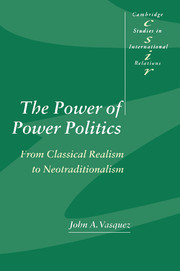Book contents
- Frontmatter
- Contents
- List of figures
- List of tables
- Preface
- Introduction
- Part I The Original Text: Classical Realism and Quantitative International Politics
- Part II Neorealism and Neotraditionalism: International Relations Theory at the Millennium
- 9 Retrospective: neorealism and the power of power politics
- 10 The promise and potential pitfalls of post-modernism: the need for theory appraisal
- 11 The realist paradigm as a degenerating research program: neotraditionalism and Waltz's balancing proposition
- 12 Mearsheimer's multipolar myths and the false promise of realist policy prescriptions: the empirical inaccuracy of the realist paradigm
- 13 Challenging the relevance and explanatory power of the realist paradigm: the debate on the end of the Cold War
- 14 Conclusion: the continuing inadequacy of the realist paradigm
- References
- Name index
- Subject index
- CAMBRIDGE STUDIES IN INTERNATIONAL RELATIONS
11 - The realist paradigm as a degenerating research program: neotraditionalism and Waltz's balancing proposition
Published online by Cambridge University Press: 22 September 2009
- Frontmatter
- Contents
- List of figures
- List of tables
- Preface
- Introduction
- Part I The Original Text: Classical Realism and Quantitative International Politics
- Part II Neorealism and Neotraditionalism: International Relations Theory at the Millennium
- 9 Retrospective: neorealism and the power of power politics
- 10 The promise and potential pitfalls of post-modernism: the need for theory appraisal
- 11 The realist paradigm as a degenerating research program: neotraditionalism and Waltz's balancing proposition
- 12 Mearsheimer's multipolar myths and the false promise of realist policy prescriptions: the empirical inaccuracy of the realist paradigm
- 13 Challenging the relevance and explanatory power of the realist paradigm: the debate on the end of the Cold War
- 14 Conclusion: the continuing inadequacy of the realist paradigm
- References
- Name index
- Subject index
- CAMBRIDGE STUDIES IN INTERNATIONAL RELATIONS
Summary
Why, then, is Realism dominant? … In Lakatos's reply to Kuhn, all turns finally on a distinction between progressive and degenerating research programmes. In that case, Realism is dominant because, despite anomalies, its selection of aspects of events and identification of trends is more enlightening and fertile than those of its rivals.
(Hollis and Smith 1990: 66)The search for a new paradigm will have its supporters, but we believe that such an approach throws the realist baby out with its dirty bathwater. Abandoning realism first assumes that viable alternatives are present. We are aware of no other world view of international relations that is as well developed (despite the ambiguities and imprecision of realism) or that has received as much empirical confirmation (despite the limited support found) as realpolitik.
(Diehl and Wayman 1994: 263)These quotations demonstrate the power of paradigms in scholarly inquiry. That these scholars, who are among the best, respectively, in international relations theory and quantitative peace research, and for whom I have the highest respect, could still find merit in the realist paradigm in the face of devastating conceptual criticism, historical anomalies, a large number of null findings, and a general dearth of strong empirical findings reflects at one and the same time the conservative nature of the discipline and the poor state of theory appraisal in the field.
Clearly, I had hoped that the readers of the original text would come to a different conclusion.
- Type
- Chapter
- Information
- The Power of Power PoliticsFrom Classical Realism to Neotraditionalism, pp. 240 - 286Publisher: Cambridge University PressPrint publication year: 1999



